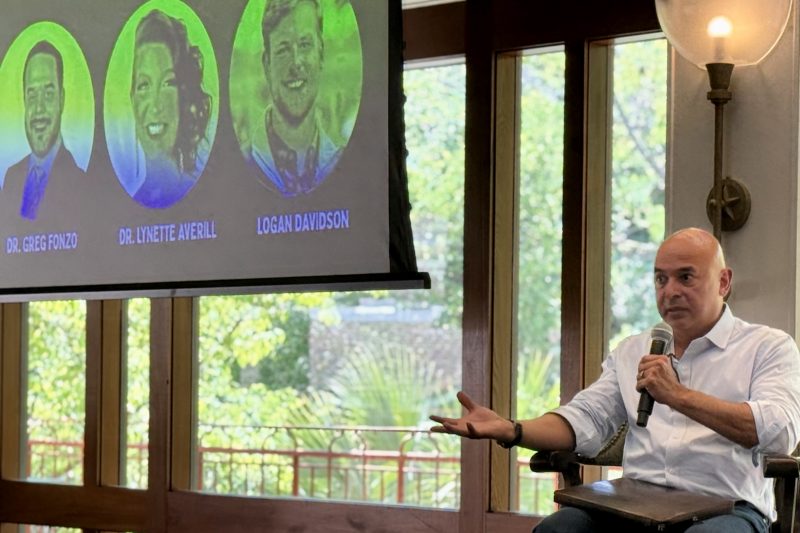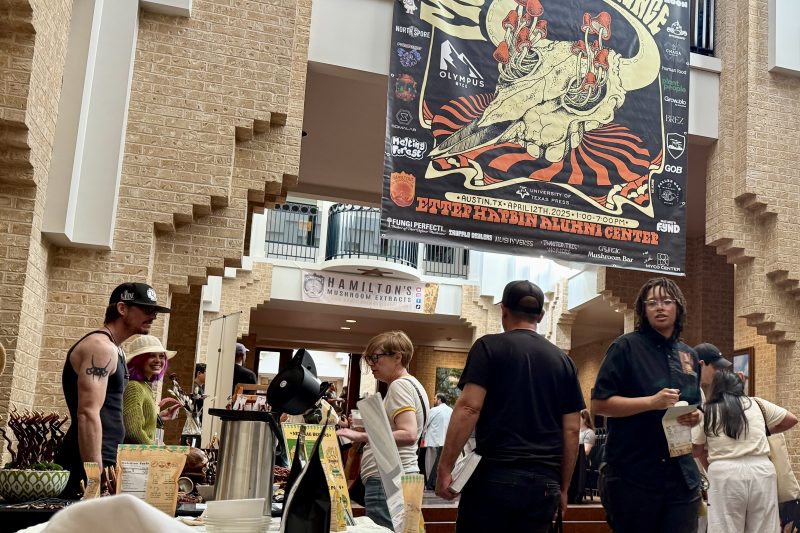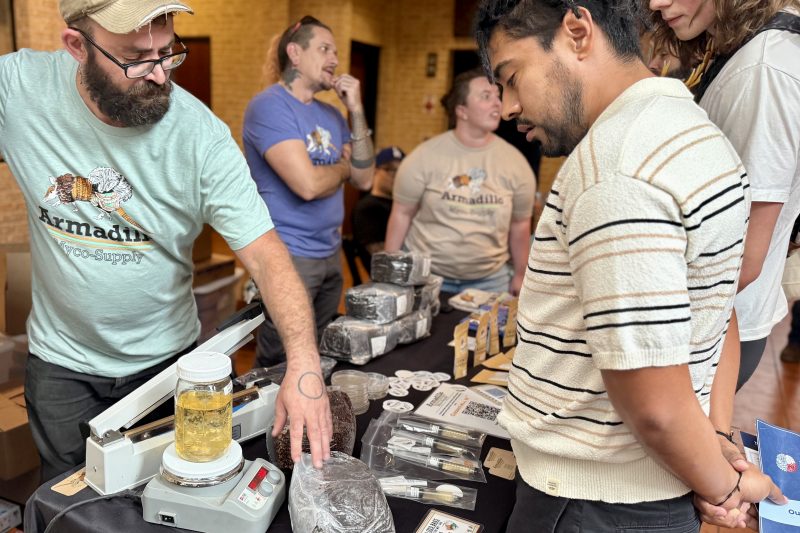Amid Crisis in Veterans Care, Texas Embarks on a ‘Psychedelic Revolution’
By Michael Karlis
Reporting Texas

Former state Rep. Al Dominguez, discusses the future of pro-psychedelic legislation in Texas at the Texas Mushroom Conference. Dominguez’s legislation led to Texas’ embrace of psychedelics as therapy. MICHAEL KARLIS/REPORTING TEXAS
On April 7, 53-year-old Navy veteran Mark Miller hailed a taxi to Audie L. Murphy Memorial Veterans Hospital in San Antonio.
Once there, at 12:34 p.m., he pulled out his phone and sent a final text message to his father.
“Papa, I love you very much and I always will,” he wrote.
He then pulled out a gun and shot himself in the hospital parking lot.
Eight days earlier, Miller had visited that same hospital seeking help for mental health issues. In an interview with KSAT news, Miller’s father said that his son had struggled with depression and anxiety since retiring from the service in 2007 and had been talked out of a previous suicide plan.
Despite that medical history, the best the doctor could do during Miller’s April 1 appointment was to prescribe Seroquel — an antipsychotic medication used to treat schizophrenia and bipolar disorder — according to a lengthy Facebook post written by his father that has since gone viral.
“Why would Mark do such a hideous thing? I know exactly why,” Miller’s father wrote in the social media post. “He is making a powerful statement to the VA and to the world on behalf of thousands of veterans. Veterans that have been neglected and pushed to the brink of disaster. Veteran’s, who’s (sic) voices have been silenced and whose plights have been ignored.”
Miller’s father continued, writing in the post that the VA should emphasize psychotherapy and other alternatives instead of antidepressants, which some studies say could increase the risk of suicide.
Miller’s story is not unique. Twenty-nine-percent of Operation Iraqi Freedom and Enduring Freedom veterans and 21% of Persian War veterans report suffering from post-traumatic stress disorder at some point in their lives, per data collected from the VA’s National Center for PTSD.
In 2022, 17.6 veterans took their life every day on average, according to the VA.
However, there is hope.
The staggering number of veteran suicides, combined with Texas’ large population of former service members, has led the state to becoming what some experts are calling the center of the “psychedelic revolution.”
A slew of bills in the Texas Legislature have garnered broad, bipartisan support, including House Bill 3137, which would mandate the largest appropriation of public funds for psychedelic research in U.S. history.
What’s more, research already being conducted on psychedelics as a treatment for PTSD at the University of Texas at Austin and Baylor’s College of Medicine appears to be promising.
Still, hurdles remain for the treatment, including getting FDA approval to bring these treatments to the public.
Legislature embraces psychedelics as therapy
Perhaps surprisingly, deep red conservative Texas has become one of the leading innovators in what some researchers and experts are calling the “psychedelic revolution.”
The University of Texas at Austin’s Dell Medical School is home to the Charmaine & Gordon McGill Center for Psychedelic Research and Therapy, which was the first psychedelic research center at a public university in the nation when it launched in 2021.
Meanwhile, ongoing studies and clinical trials at Baylor’s College of Medicine into whether people with PTSD can be treated with psychedelics is the first state-funded psychedelic research since the Controlled Substance Act of 1971.
“It’s good to see that these institutions have begun to shift their thinking and recognize that psychedelics are not these dangerous gateway demon drugs that will make you go crazy and jump out of a window, which was the predominant propaganda in the ‘60s, but really that these compounds have a very promising therapeutic potential,” said Dr. Greg Fonzo, co-director of UT-Austin’s psychedelic research center.
This groundbreaking, publicly funded research at UT-Austin and Baylor was made possible because of House Bill 1802 authored by then-Rep. Alex Dominguez, D-Brownsville, in 2021. Texas Gov. Greg Abbott allowed the bipartisan bill to become law without signing it.
Under HB 1802, the state allowed the Texas Department of State Health Services, in collaboration with the Texas Medical Board, to conduct and fund studies into the use of psychoplastogens, such as MDMA, ketamine and psilocybin, to treat conditions including depression, anxiety, bipolar disorder, chronic pain, migraines and PTSD.
“The approach we took with HB 1802 was to find a group of humans that everybody would support politically: veterans,” Dominguez said. “By really leaning into House member’s willingness not just to support veterans, but being afraid of being called out for not supporting veterans really put a lot of political pressure on people to not just be supportive, but be receptive to the idea of this bill.”
That same political tactic is still effective.
At a time when Texas lawmakers are seriously considering two bills that would ban the sale of the vast majority of THC products, the House is considering the largest appropriation of public funds for psychedelic research in U.S. history. That bill, House Bill 3717, has managed to garner broad bipartisan support.
Authored by Rep. Cody Harris, R-Tyler, HB 3717, dubbed the “Texas Ibogaine Initiative,” would allocate $100 million to conduct research on the medical benefits of Ibogaine, a traditional African psychedelic plant that, in low doses, has been proven to treat addiction and depression in mice.
Of that sum, half would be public money, with the remaining funding coming from the private sector.
“It shows that (lawmakers) can distinguish some things and people get it,” Dominguez said. “I think this allows other public policy makers the permission to begin the discussion and say ‘well, maybe the taboo regarding this type of substance is not what it was 20 or 30 years ago.”
Adding urgency among advocates and supporters in the House is the Trump administration’s reported plans to axe 80,000 employees at the VA.
Although the initial research appears promising, Fonzo was keen on warning the hundreds of attendees at the Third Annual Texas Mushroom Conference in April that psychoplastogen’s are not a panacea.
“They do not cure mental illness; they do not work for everybody. But for a certain subset of people, they will be a valuable therapeutic,” he said.
Treating PTSD with psychedelics
The biggest benefit that psychoplastogens – drugs like ketamine, MDMA, LSD, and psilocybin – have over other treatments, including antidepressants, talk therapy, and other FDA-approved drugs, is the speed with which PTSD patients see results, said Dr. Lynette Averill, an associate professor of psychiatry and behavioral sciences neuropsychiatry and lead researcher into psychedelic therapy at Baylor Medical School.
“I certainly do not intend to minimize the slow-acting things,” Averill said. “SSRIs (selective serotonin reuptake inhibitors) and talk therapy are crucial interventions that do work very well for some people. The challenge is, for many people, even in the best scenarios, is that it’s weeks to months to actually see significant benefits.”

Vendors sell mushrooms, artwork and other novelties at UT-Austin’s alumni center during the Texas Mushroom Conference on April 12. MICHAEL KARLIS/REPORTING TEXAS
Averill also noted the negative side effects that some patients experience with SSRI use, including weight gain, low sex drive, and emotional numbing.
On the other hand, Averill’s research at Baylor—which received $2 million in funding through HB 1802—has shown that psychoplastogens have a “rapid-acting and robust effect on neuroplasticity.”
Neuroplasticity is the brain’s ability to adapt and change by reorganizing synaptic connections.
“It’s happening in a number of hours to days, rather than weeks to months, which I think is quite literally life saving,” Averill said. “That’s the case even with significantly trauma-exposed individuals with very chronic, severe histories. We are seeing people with significant changes in five hours.”
According to Averill’s research, psychoplastogens allow people who are suffering from PTSD to view past trauma in a different light.
She compared PTSD to going down a ski slope. Once those memories and guilt are ingrained in a veteran’s mind, their thoughts and past trauma always end up going downhill and ending up with the same conclusion.
However, psychoplatogens lay down a fresh coat of snow on that ski slope, as Averill put it, allowing folks suffering from PTSD to forge new paths and interpret when navigating past trauma.
“A couple of weeks ago, one of our veterans said he felt like the dose gave him a tactical advantage from which he could really reevaluate everything and relearn those memories in a more accurate and less painful way and select the pieces he wanted to keep,” Averill said.
Some researchers have taken it a step further.
David Nichols, a professor emeritus at Purdue University, has previously claimed that psychedelics can excite and stimulate neurons in the brain, allowing patients to access and relive memories in explicit detail.
“The things that are not normally processed, the unconscious materials. Those are normally below our level of conscious awareness,” Nichols said during a presentation at SXSW 2023. “But, that material can be accessed by these neuronal cells when they’re more excitable.”
However, Manoj Doss, a research fellow at UT Austin’s Dell Medical School Department of Psychiatry and Behavioral Science who studies psychedelics’ effects on memory, disputes Nichols’ claims that psychedelics can allow patients to recall exact details of memories.
“There’s actually not a lot of evidence to the idea that if you have repressed memories that the drug might be able to help you unlock them,” Doss said. “The evidence is not there for that yet, and if anything, it seems to be, if you try to retrieve memories under the effects of psychedelics, it might actually distort your memory and produce false memories.”
Mushroom boutique
While Averill’s research at Baylor focuses on PTSD treatment, Fonzo’s ongoing clinical trials at UT-Austin are examining if psychoplastogens can treat chronic and treatment-resistant depression, as well as how to prescribe the most effective dosage to meet a patient’s needs.
“It just illustrates another thing we really don’t know,” Fonzo said. “What is the right rate of dosing? How frequently are people going to need to take psychedelics in order to really capitalize on that therapeutic effect? Does that diminish over time? We know, for example, that’s a common issue with ketamine. There’s just a ton of work to be done in this area.”

Michael Hart, left, of Armadillo Myco-Supply, touts the benefits of Lion’s Mane mushroom extract during the Texas Mushroom Conference in Austin on April 12. MICHAEL KARLIS/REPORTING TEXAS
Once Fonzo and other researchers at Dell Medical School figure out what dose to describe patients depending on their symptoms, UT-Austin and Baylor’s next steps is to collaborate with state government agencies to figure out how this type of therapy could be rolled out to the public on a mass scale.
That’s easier said than done, according to Fonzo.
Psychedelic therapies that use psilocybin can last six to eight hours, meaning at least two licensed practitioners would have to “trip sit” their patient. Fonzo said two would be the minimum in case one had to step out to use the restroom or grab lunch.
Other costs include an electrocardiogram, blood pressure monitoring, lab work and physical exams to ensure that the patient is fit enough to undergo the trip.
“My sense is, if and when it gets approved, it will first come out in very small, sort of boutique-like settings,” Fonzo said.
Fonzo also warned that, initially, the treatments would most likely not be part of most basic healthcare plans and that patients would need to demonstrate that every other treatment had failed before insurance companies would even consider covering such an endeavor.
Group administration is being explored as a more cost-effective solution. However, Fonzo warns that it may not be a viable option.
“If anyone has done group therapy in the past, you may have had somebody in your group that you wish wasn’t here,” Fonzo said. “The other problem with that is it’s a little bit harder to control the dynamic in a group setting.”
Using faster-acting physoplastogen’s with shorter trips, including DMT, which only lasts about 90 minutes, could also be an alternative, more economical option.
Indeed, some drug companies are spending millions of dollars engineering synthetic compounds that have the same positive effects as psychedelics with shorter trips, or no trips at all.
“If those drugs can produce a therapeutic benefit on par with the psychedelic experience in the absence of inducing a shift in one’s state of consciousness, then that is really useful because then you don’t need to take it in a specialized setting,” Fonzo said.
Canadian pharmaceutical company Cybin Cybin’s drug, CYB003 – a synthetic psychedelic with similar effects as psilocybin except with a shorter trip duration – was granted “breakthrough therapy” designation by the FDA last year.
The sought-after status, which has also been awarded to LSD and MDMA in recent years, means the FDA accepts that these therapies are as good, if not better, in terms of outcomes than what is conventionally available.
Even so, the FDA is still a long way off from approving psilocybin for medical treatment, Fonzo warns.
FDA decisions limit availability
If passed this legislative session, Senate Bill 3005, introduced by Sen. Cesar Blanco, R-El Paso, and its companion bill HB 4014, filed by Rep. John Bucy, D-Austin, would permit psychedelic therapies to be administered to non-clinical trial patients pending U.S. Food and Drug Administration approval. This would mean researchers at UT-Austin and Baylor wouldn’t need to wait for the federal Drug Enforcement Agency to reclassify the treatments to begin treating the masses.
Although that seems promising, the FDA’s decision last year to reject MDMA-assisted therapy for PTSD for the public blew a major setback for researchers and patients, experts at the conference said.
Even so, the reasoning for the FDA’s rejection was more complex than skepticism regarding the merits of psychoplastogens.
The Institute for Clinical and Economic Review, an independent nonprofit that analyzes the evidence for clinical and cost effective treatments, found that the MDMA study submitted by Lykos Therapeutics found that “therapists encouraged favorable reports by patients” and that the publicly available evidence didn’t effectively weigh the benefits of therapy against potential harms.
Further complicating matters was that one of the patients in the study was sexually abused, and the study’s authors failed to disclose their affiliation with the Multidisciplinary Association of Psychedelic Studies, creating a conflict of interest.
What’s more, for a drug-induced therapy to gain FDA approval, researchers must conduct a double-blind study to prove the positive effects of the treatment. The problem, of course, is that it’s going to be pretty obvious which trial subjects got a placebo, and who received a psychoplastogen like MDMA or psilocybin.
There could be a workaround, Fonzo said.
In the case of MDMA, researchers are trying to use comparators, including methamphetamines and amphetamines, in the double-blind study so that patients will have a more difficult time determining whether they were given a placebo.
Although patients given a comparative stimulant might believe they’ve been given MDMA, those comparative substances may be different enough from MDMA to lack its therapeutic effects when treating PTSD, still creating a valid study, according to Fonzo.
“I think if there was a good faith effort put forth to the FDA showing that we did everything we could in order to try and get around this issue, I don’t think it will be as much of a problem the next time around.”
What’s next?
The current Texas legislative session is running short of time. Although the $100 million Texas Ibogaine Initiative passed the House Public Health Committee without amendments last week, no date has been set for its hearing on the House floor.
But with the publicity surrounding the death of Miller, and bipartisan support for psychedelic treatments for veterans, Dominguez remains optimistic.
“We’re not talking about dropping acid and going on a trip. We’re really talking about very specific dosing to save someone’s life,” the former lawmaker said. “I think being able to bring in the emotion, along with the science, really is a one-two combo that makes it really hard for somebody to say no because you’re either saying no to the science, which says it can work, or you’re saying no to a veteran who just fought for you.”
Meanwhile, Baylor researcher Averill worries that more veterans like Miller will suffer preventable deaths if meaningful legislation and FDA approval don’t come soon.
“We are at a point in our society where we are in a severe mental health crisis where we have to be considering these sorts of things because so many people cannot wait for full FDA approval and scalability.”
Although that might be true, Fonzo warned folks at the conference using psychedelics under the table, both medically and recreationally, to not jeopardize the psychedelic movement or ongoing research by acting foolishly.
“One of the things that can definitely derail a movement like this is a negative news story about somebody who decided to take too many mushrooms at ACL, thought they were Jesus Christ, and decided to jump off stage and having a traumatic brain injury.”
How to get help:
The Suicide and Crisis Lifeline is available 24 hours a day by dialing 988.
Veterans suffering from PTSD are invited to apply as trial participants in Dr. Lynette Averill’s clinical trials at Baylor College of Medicine by emailing [email protected]